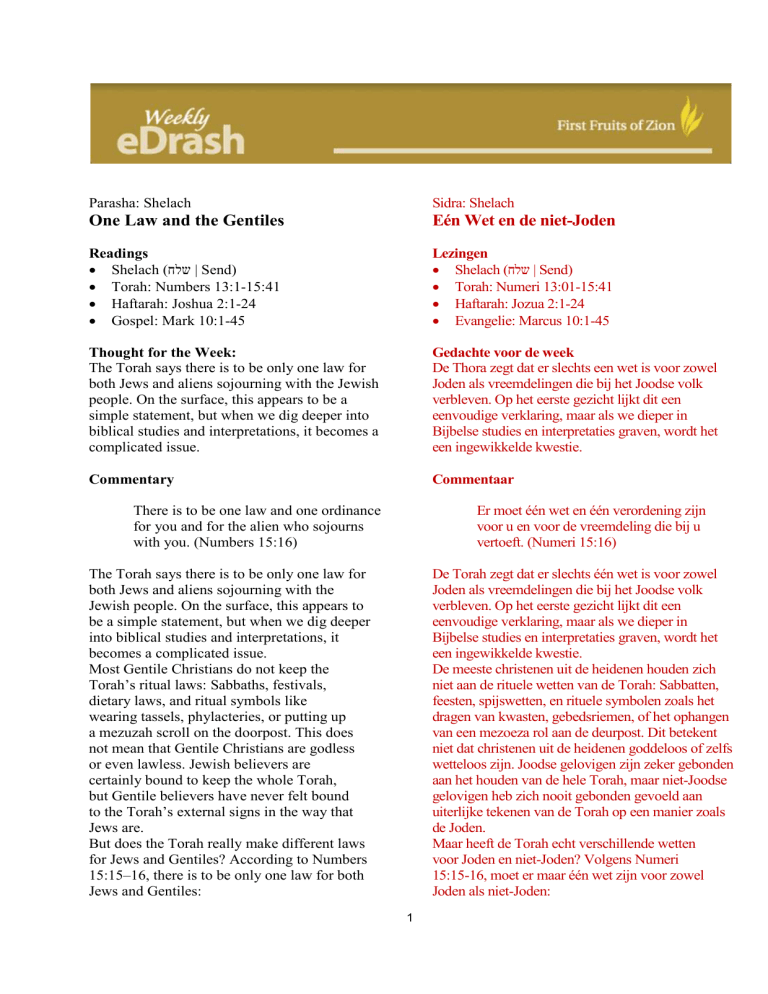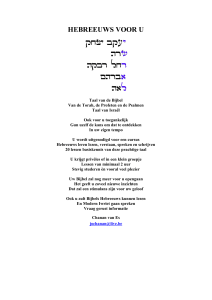
Parasha: Shelach
Sidra: Shelach
One Law and the Gentiles
Eén Wet en de niet-Joden
Readings
Shelach ( | שלחSend)
Torah: Numbers 13:1-15:41
Haftarah: Joshua 2:1-24
Gospel: Mark 10:1-45
Lezingen
Shelach ( | שלחSend)
Torah: Numeri 13:01-15:41
Haftarah: Jozua 2:1-24
Evangelie: Marcus 10:1-45
Thought for the Week:
The Torah says there is to be only one law for
both Jews and aliens sojourning with the Jewish
people. On the surface, this appears to be a
simple statement, but when we dig deeper into
biblical studies and interpretations, it becomes a
complicated issue.
Gedachte voor de week
De Thora zegt dat er slechts een wet is voor zowel
Joden als vreemdelingen die bij het Joodse volk
verbleven. Op het eerste gezicht lijkt dit een
eenvoudige verklaring, maar als we dieper in
Bijbelse studies en interpretaties graven, wordt het
een ingewikkelde kwestie.
Commentary
Commentaar
There is to be one law and one ordinance
for you and for the alien who sojourns
with you. (Numbers 15:16)
Er moet één wet en één verordening zijn
voor u en voor de vreemdeling die bij u
vertoeft. (Numeri 15:16)
The Torah says there is to be only one law for
both Jews and aliens sojourning with the
Jewish people. On the surface, this appears to
be a simple statement, but when we dig deeper
into biblical studies and interpretations, it
becomes a complicated issue.
Most Gentile Christians do not keep the
Torah’s ritual laws: Sabbaths, festivals,
dietary laws, and ritual symbols like
wearing tassels, phylacteries, or putting up
a mezuzah scroll on the doorpost. This does
not mean that Gentile Christians are godless
or even lawless. Jewish believers are
certainly bound to keep the whole Torah,
but Gentile believers have never felt bound
to the Torah’s external signs in the way that
Jews are.
But does the Torah really make different laws
for Jews and Gentiles? According to Numbers
15:15–16, there is to be only one law for both
Jews and Gentiles:
De Torah zegt dat er slechts één wet is voor zowel
Joden als vreemdelingen die bij het Joodse volk
verbleven. Op het eerste gezicht lijkt dit een
eenvoudige verklaring, maar als we dieper in
Bijbelse studies en interpretaties graven, wordt het
een ingewikkelde kwestie.
De meeste christenen uit de heidenen houden zich
niet aan de rituele wetten van de Torah: Sabbatten,
feesten, spijswetten, en rituele symbolen zoals het
dragen van kwasten, gebedsriemen, of het ophangen
van een mezoeza rol aan de deurpost. Dit betekent
niet dat christenen uit de heidenen goddeloos of zelfs
wetteloos zijn. Joodse gelovigen zijn zeker gebonden
aan het houden van de hele Torah, maar niet-Joodse
gelovigen heb zich nooit gebonden gevoeld aan
uiterlijke tekenen van de Torah op een manier zoals
de Joden.
Maar heeft de Torah echt verschillende wetten
voor Joden en niet-Joden? Volgens Numeri
15:15-16, moet er maar één wet zijn voor zowel
Joden als niet-Joden:
1
As for the assembly, there shall be one
statute for you and for the alien who
sojourns with you, a perpetual statute
throughout your generations; as you are,
so shall the alien be before the LORD.
There is to be one Torah and one
ordinance for you and for the alien who
sojourns with you. (Numbers 15:15–16)
Aangaande de vergadering, zal er één statuut
zijn voor u en voor de vreemdeling die bij u
vertoeft, een eeuwige inzetting door uw
geslachten heen; zoals u bent, zo zal de
vreemdeling zijn vóór des HEEREN
aangezicht. Er moet één Torah en één
inzetting zijn voor u en voor de vreemdeling
die bij u vertoeft. (Numeri 15:15-16)
This seems simple enough. According to these
verses, there is one law for both Jews and
Gentiles. Therefore, Gentile believers should
keep the whole Torah.
But wait. It’s not that clear.
First of all, the context deals not with the
application of Torah as a whole, but specifically
with the sacrifices. In other words, if an alien
wanted to offer a sacrifice in the Temple he needed
to follow the same Torah guidelines as the
Israelite. The passage is not saying that all the laws
of Torah apply equally to Jews and Gentiles.
Second, by the time of the apostles, the word
translated as “alien” (ger, )גרwas no longer
understood as just a Gentile non-Jew. The
Hebrew word had shifted its semantic value to
refer specifically to a Gentile who had gone
through a full, legal conversion to become
Jewish, i.e., a proselyte. That conversion process
included circumcision, immersion, and a
sacrifice. That’s how the Greek version of the
Torah (LXX) translates the word too. That’s
probably how the apostles would have
understood it. They would have interpreted
Numbers 15:15–16 to read as follows:
Dit lijkt duidelijk. Volgens deze verzen, is er één
wet voor zowel Joden als niet-Joden. Daarom
moeten niet-Joodse gelovigen de hele Torah
naleven.
Maar wacht. Zó duidelijk is het niet.
Allereerst behandelt de context niet de toepassing
van Torah als geheel, maar meerbepaald de offers.
M.a.w., wanneer een vreemdeling een offer in de
Tempel wilde aanbieden, moest hij dezelfde Torah
richtlijnen volgen als de Israëliet. De passage zegt
niet dat alle wetten van de Torah voor zowel Joden
als niet-Joden gelden.
Ten tweede werd ten de tijde van de apostelen het
woord vertaald als "vreemdeling" (ger, )גרniet
langer gezien als alleen een heidense niet-Jood
betreffend. De betekenis van het Hebreeuwse woord
was geëvolueerd tot een verwijzen naar die heiden,
die via een volledige, wettelijke bekering was gegaan
om Joods te worden, m.a.w. een proseliet. Dat proces
van bekering hield in: besnijdenis, onderdompeling,
en een offer brengen. Dat is ook hoe de Griekse
versie van de Torah (LXX) het woord vertaalt. Dat is
waarschijnlijk hoe de apostelen het begrepen hadden.
Zij zouden Numeri 15:15-16 als volgt hebben
geïnterpreteerd:
As for the assembly, there shall be one
statute for Jews and for the proselyte, a
perpetual statute throughout your generations; as a Jew is, so shall the proselyte be
before the LORD. There is to be one Torah
and one ordinance for Jews and for the proselyte who sojourns with you. (Numbers
15:15–16, my paraphrase)
Aangaande de vergadering zal er één statuut
zijn voor de Joden en voor de proseliet, een
eeuwige inzetting voor uw geslachten; zoals
een Jood is, zo zal de proseliet zijn vóór de
HEERE. Er moeten één Torah en één
ordonnantie zijn voor Joden en voor de
proseliet die bij u vertoeft. (Numeri 15:1516, mijn parafrase)
That reading makes it clear that both Jews and
proselytes to Judaism are obligated to the same
laws of Torah, but it does not help clear up the
question of Gentile believers who have not
become legally Jewish through a conversion.
One might suppose that the Gentile believers
who were fellowshipping in the apostolic
Deze lezing maakt duidelijk dat zowel Joden als
proselieten van het Jodendom aan dezelfde wetten
van de Torah gebonden zijn, maar het helpt niet de
vraag van niet-Joodse gelovigen beantwoorden die
niet wettelijk Jood zijn geworden via zo’n bekering.
Men zou kunnen veronderstellen dat de niet-Joodse
gelovigen die in de apostolische gemeenschappen
2
communities should fit into the category of
“the alien who sojourns with you,” but when
the apostles considered this question in Acts
15, they left the matter open. They gave the
Gentile believers four minimum standards for
fellowship within the Jewish synagogue
communities, but they did not issue a
mandate clarifying Gentile obligation to the
whole Torah.
The same open posture of Acts 15 seems to be
reflected in the Didache. The Didache is allegedly
a collection of apostolic instructions for Gentile
believers. When discussing the question of how
much Torah a Gentile is obligated to keep, the
Didache recommends keeping all of it, but leaves
the matter up to an individual’s capacity:
kameraadschappelijk omgang hadden, moeten
hebben behoort tot de categorie van "de vreemdeling
die bij u vertoeft," maar als de apostelen zich dit in
Handelingen 15 afvroegen, lieten ze de kwestie
open. Ze gaven de niet-Joodse gelovigen vier
minimumnormen voor gemeenschap binnen de
Joodse synagoge gemeenschappen, maar ze hebben
geen mandaat afgeven dat niet-Joden tot naleven van
de hele Torah verplicht zijn.
Dezelfde open houding van Handelingen 15 lijkt te
worden weerspiegeld in de Didache. De Didache is
naar verluidt een verzameling van apostolische
instructies voor niet-Joodse gelovigen. Bij de vraag
hoeveel Torah een niet-Jood verplicht is om na te
leven, beveelt de Didache alles aan, maar laat de
zaak over aan de individuele capaciteit:
If you are able to bear all the yoke
of the Lord [i.e., Torah], you will be
perfect; but if you are not able, do as
much as you are able to do.
(Didache 6:2)
Als je in staat bent om heel het juk van de
Heer [d.w.z. Torah] te dragen, zult u
volmaakt zijn; maar als je niet in staat bent,
doe zo veel als je in staat bent te doen.
(Didache 6:2)
The Didache agrees with Numbers 15:15–16.
There is not supposed to be a different Torah
for Gentile believers. The Gentile believers
are not supposed to have a different type of
worship or religion. There is only one Torah
for God’s people. The only question left open
is to what extent the Gentile believer is
obligated. Most of the laws of the Torah
apply equally to Jewish and Gentile disciples
of Yeshua.
On the other hand, Gentile believers are not
obligated to keep all of the ceremonial laws
as the Jewish believers such as circumcision
and other distinct markers of Jewish identity
like the calendar, the holy days, the dietary
laws, and so forth. Despite that, the Bible
does not create alternative Gentile versions
of these institutions.
In the days of the apostles, the Gentile believers
kept most of those things along with the Jewish
believers as part of their participation in their
shared religion.
De Didache is het eens met Numeri 15:15-16. Er
wordt geen andere Torah voor gelovigen uit de
heidenen verondersteld. De niet-Joodse gelovigen
worden niet verondersteld een ander type van
aanbidding of religie te hebben. Er is voor Gods
volk slechts één Torah. De enige vraag die open
blijft, is in hoeverre de niet-Joodse gelovige
verplicht is. Het merendeel van de wetten van de
Torah gelden voor zowel Joodse als niet-Joodse
volgelingen van Yeshua.
Aan de andere kant, zijn Joodse gelovigen niet
verplicht om alle ceremoniële wetten te houden
zoals de Joodse gelovigen, zoals de besnijdenis en
andere onderscheidende merktekens van de joodse
identiteit, zoals de joodse kalender, de joodse heilige
dagen, de spijswetten, enzovoort. Ondanks dat, geeft
de Bijbel geen alternatieve niet-Joodse versies van
deze instellingen.
In de dagen van de apostelen, hielden de niet-Joodse
gelovigen de meeste van die dingen samen met de
Joodse gelovigen als onderdeel van hun deelname
aan hun gedeelde religie.
© 2012 First Fruits of Zion, Inc. | All Rights Reserved
Printed from: http://ffoz.org/resources/edrash/shelach/one_law_and_the_gentiles.php
3










